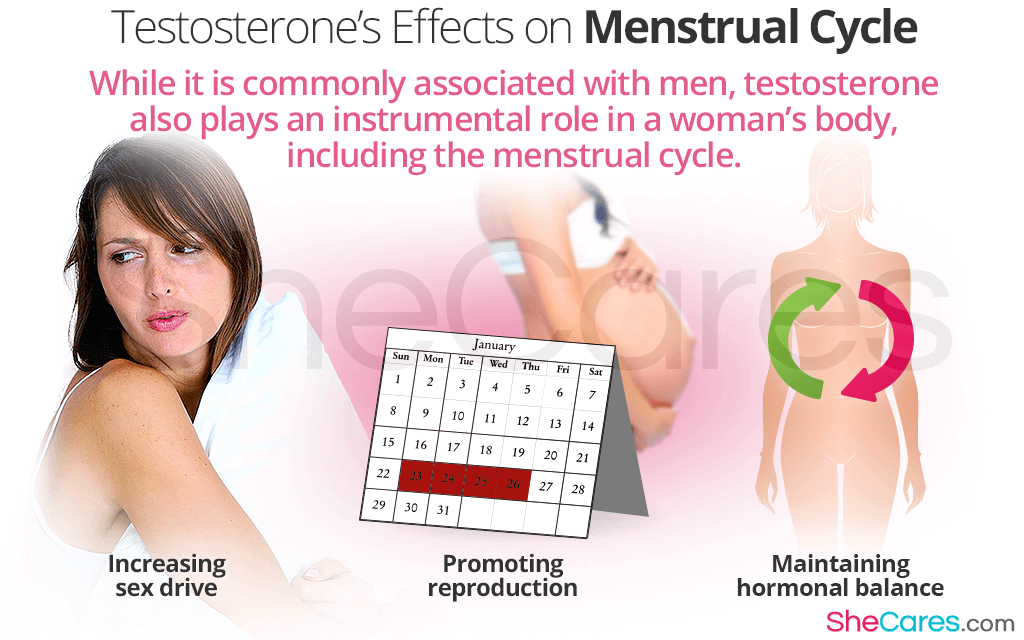Although testosterone is most commonly associated with men, it also plays an instrumental role in a woman's body, including throughout the menstrual cycle. As such, its imbalance might be behind various physical or emotional symptoms that is often wrongly attributed to other causes.
Keep reading to learn more about testosterone and menstruation, including how does testosterone affect menstrual cycle, what happens if its levels are imbalanced, and how to keep them in equilibrium for optimal menstrual health.
About Testosterone
Testosterone belongs to a class of sex steroid hormones called androgens.
Although in much lesser amounts than men, testosterone is largely produced in the ovaries and adrenal glands. Once produced, some of testosterone in the female body is converted into estrogen.1
How Does Testosterone Affect Menstrual Cycle?
The main role of testosterone during the menstrual cycle is increasing a woman's sex drive.
Its effects are more expressed mid-cycle in the days leading up to ovulation, which is designed to encourage sexual intercourse in a woman's most fertile period and, ultimately, promote reproduction.
Moreover, normal testosterone levels are necessary for maintaining estrogen and progesterone balance. Since all three hormones are interlinked, an imbalance of one can throw off the others, compromising the health of the female reproductive system and menstrual patterns.
What Happens if Testosterone is Unbalanced?
While slight fluctuations of testosterone are normal throughout life, persistently abnormal levels can have serious repercussions on a woman's health, including her menstruation.
Both high and low testosterone levels can deregulate the entire reproductive system, potentially leading to:
- Irregular periods, including absent menses
- Ovulation problems, including irregular or absent ovulation
- Low libido
- Vaginal dryness
- Infertility
High testosterone levels are also associated with polycystic ovary syndrome (PCOS), characterized by insulin resistance, which can affect the maturation and release of ovarian eggs. In fact, PCOS is one of the leading causes of fertility problems.2
How to Keep Testosterone Balanced
To maintain an equilibrium of not only testosterone, but also other reproductive hormones, a woman is encouraged to implement wholesome lifestyle practices alongside the use of alternative medicine.
They can positively impact the endocrine system, thus preventing insulin resistance, reducing cortisol levels, and improving overall hormonal health. They may include the following:
- Nutritious diet with complex carbohydrates, healthy fats, and lean protein
- Regular exercise combining moderate resistance and strength training
- Stress-relief practices, like meditation or deep breathing exercises
- Herbal supplements, including phytoestrogenic supplements, like Longjack root, or hormone-balancing supplements, like Macafem
Key Takeaways
While for many women it is often the least paid-attention-to hormone, testosterone is as important as other reproductive hormones. Its imbalance can disrupt the functioning of the menstrual cycle, leading to unpleasant symptoms and jeopardizing a woman's chances of getting pregnant. As such, when suspecting that the underlying cause of one's physical and psychological ailments might be abnormal hormone levels, a doctor can order testosterone tests to complete the diagnosis and help a woman move towards finding treatment and long-lasting relief.
Sources
- Boston University School of Medicine Sexual Medicine. (2003). Testosterone insufficiency in women: fact or fiction? Retrieved December 2, 2019 from http://www.bumc.bu.edu/sexualmedicine/publications/testosterone-insufficiency-in-women-fact-or-fiction/
- Medline Plus. (2018). Testosterone Levels Tests. Retrieved December 2, 2019 from https://medlineplus.gov/lab-tests/testosterone-levels-test/
- Women in Balance Institute. (n.d.). About Hormone Imbalance. Retrieved December 2, 2019 from https://womeninbalance.org/about-hormone-imbalance/
Footnotes:
- Society for Endocrinology. (2018). Testosterone. Retrieved November 2, 2019 from https://www.yourhormones.info/hormones/testosterone/
- Office on Women's Health. (2019). Polycystic ovary syndrome. Retrieved November 2, 2019 from https://www.womenshealth.gov/a-z-topics/polycystic-ovary-syndrome



